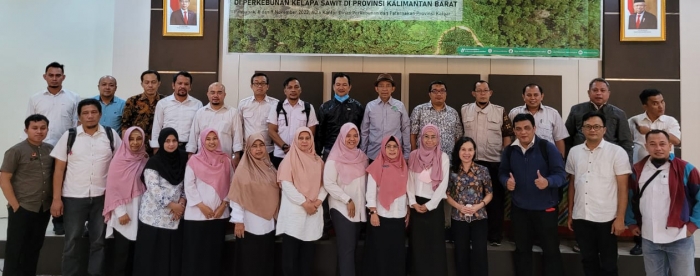Pelatihan KBKT untuk Dinas Perkebunan Kabupaten di Provinsi Kalimantan Barat: Menuju Perumusan Kerangka Peraturan Pemantauan KBKT

Indonesia - 17 November, 2022
Prinsip dan pendekatan Kawasan Bernilai Konservasi Tinggi (KBKT) telah disosialisasikan sejak tahun 2010 melalui pelatihan, standar sertifikasi, dan belakangan ini melalui kebijakan pemerintah. Walau, menurut Hairil Anwar, S. Hut, selaku Kepala Bidang Perlindungan Sumber Daya Alam dan Ekosistem Dinas Lingkungan Hidup dan Kehutanan (DLHK) Kalimantan Barat (Kalbar), “Tercatat hanya sekitar 10% perusahaan sawit dari seluruh perusahaan yang terdaftar di Kalimantan Barat (Kalbar) yang telah secara rutin melaporkan pengelolaan KBKTnya kepada DLHK Provinsi Kalbar”. Fenomena ini diduga disebabkan oleh kurangnya kapasitas Dinas LHK untuk memantau dan menegakkan kebijakan seta rendahnya kesadaran dan inisiatif dari Unit Pengelola sawit untuk melaporan KBKT kepada pemerintah di tingkat Kabupaten dan Provinsi, serta tidak adanya sharing data dari tingkat nasional/pusat (ISPO & RSPO) kepada pemerintah tingkat Provinsi dan Kabupaten untuk menginisiasi pemantauan HCVA di tingkat tapak.
Setelah aktif dalam penyusunan panduan KBKT, mempromosikan, dan mengarusutamakannya selama dua dekade terakhir, Tropenbos Indonesia bekerja sama dengan GIZ SASCI+ untuk memfasilitasi Dinas Perkebunan dan Peternakan Kalbar untuk menyelenggarakan pelatihan Identifikasi dan Pemantauan NKT di Pontianak pada tanggal 8 dan 9 November 2022. Pelatihan ini diikuti oleh 33 perwakilan Dinas Pertanian dan Perkebunan dari sebagian besar kabupaten di Provinsi Kalbar.
Pelatihan ini bertujuan untuk mengarusutamakan kegiatan identifikasi, pemantauan dan evaluasi KBKT dengan memperkuat peran Dinas Perkebunan Kabupaten. Pelatihan ini juga bertujuan untuk menyelaraskan tugas antara Dinas Pertanian dan Perkebunan dengan DLHK Provinsi yang sebelumnya telah bertugas dalam pemantauan KBKT.
Dengan demikian upaya ini dapat memperkuat pelaksanaan Perda Kalbar No.6/2018, tentang Pengelolaan Usaha Berbasis Lahan Berkelanjutan dimana setiap usaha berbasis lahan perlu mengalokasikan areal konservasi (KBKT) paling sedikit 7% dari luas izin usaha. KBKT di luar kawasan hutan negara (APL) ini selanjutnya dapat didaftarkan sebagai FoLU (Forestry and Other Land-Use) Carbon Net Sink 2030 sehingga berkontribusi pada penurunan emisi yang ditetapkan secara nasional (Nationally Determined Contribution – NDC) pada tahun 2030.
Dengan memperkenalkan metode identifikasi dan pemantauan KBKT kepada Dinas Perkebunan Kabupaten, prosedur pemantauan KBKT dapat ditambahkan dalam Penilaian Usaha Perkebunan (PUP). Pelatihan ini juga membahas tentang kebutuhan untuk menyusun dan membuat peta KBKT se-Kalimantan Barat secara kolektif. Kebutuhan akan kerangka hukum pada pemantauan dan evaluasi KBKT di tingkat nasional, provinsi, dan kabupaten juga didiskusikan.
"Besarnya kerugian yang disebabkan bencana banjir dan kebakaran hutan dan lahan di Provinsi Kalbar sebagai dampak perubahan iklim seharusnya membuat perusahaan sawit sadar betapa pentingnya identifkasi dan penetapan KBKT dalam luasan yang proporsional di konsesi mereka.”, ucap Ir. Muhammad Munsif, M.M., Kepala Dinas Perkebunan dan Peternakan Provinsi Kalbar, dengan menggaris-bawahi seberapa pentingnya KBKT dari sudut pandang pencegahan bencana.
Penetapan KBKT merupakan bagian dari komitmen perusahaan perkebunan sawit dalam pengelolaan berkelanjutan sebagaimana diamanatkan dalam Peraturan Menteri Pertanian No.19/2011 tentang ISPO. Peraturan ini didukung oleh Peraturan Gubernur Kalbar No.3/2022 tentang Rencana Aksi Provinsi Kalbar untuk Kelapa Sawit Berkelanjutan (RAD-KSB).
Peserta pelatihan diharapkan mampu mengarusutamakan pentingnya pemantauan identifikasi, penetapan dan pengelolaan KBKT untuk memperbaiki pengelolaan kebun sawit menuju keseimbangan antara tujuan ekonomi dan konservasi di Provinsi Kalbar.
Untuk mendukung tugas baru Dinas Perkebunan Kalbar, pada tahun 2023 Dinas Perkebunan dan Peternakan Kalbar bekerjasama dengan Tropenbos Indonesia akan menginisiasi peraturan untuk melengkapi tugas pokok dan fungsi Dinas Perkebunan di kabupaten dan provinsi dalam memantau dan mengevaluasi KBKT di Unit Pengelola Sawit.

